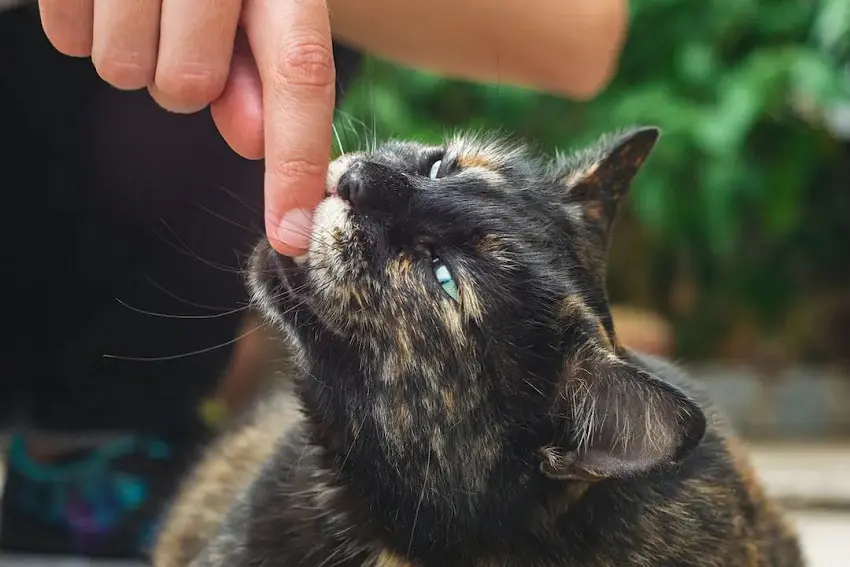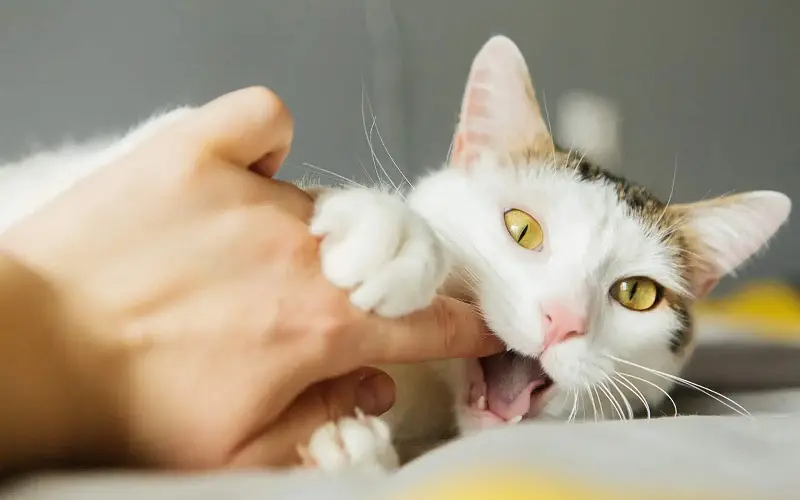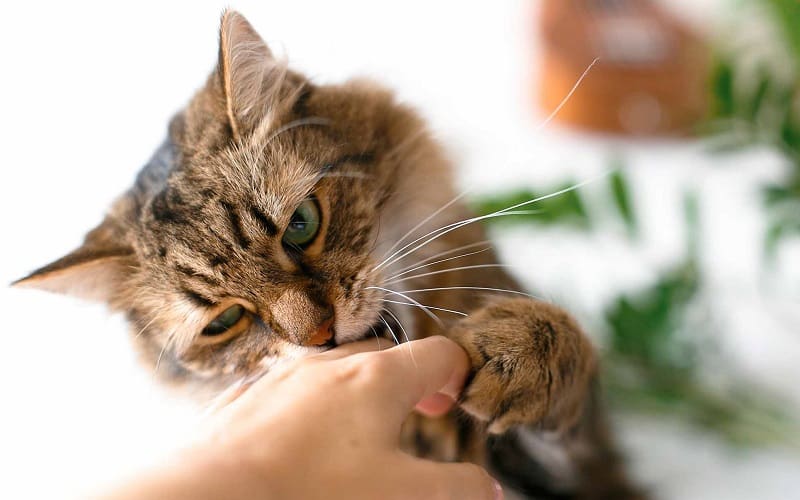Last Updated: 3 months ago
It’s not uncommon for cats to bite their pet owners from time to time. In fact, it’s one of the most common aggressive behaviors that cats display.
Why do cats bite you, and what does it mean? While it may seem like a minor thing, a cat bite can actually be quite dangerous.
Cat bites can cause serious infections, so it’s important to understand why cats might bite and how to deal with it if it happens.
Dealing with a biting cat can be difficult, but it’s important to remember that it’s not uncommon. By understanding the reasons behind the behavior, you can work on addressing it and keeping everyone safe.
Reasons Why Cats Bite

Cats are known for their affectionate and loving nature, but sometimes they can bite.
While it may seem like a sign of aggression, there are actually several reasons why cats bite that has nothing to do with being angry or aggressive.
Understanding the root cause of biting behavior is key to helping your cat feel safe and secure in its environment.
Why do cats bite? What does it mean? Here are some explanations:
1. Your Cat is Stressed
One common reason why cats bite their pet parents is stress.
Cats often become stressed when they’re exposed to unfamiliar people or animals, loud noises, changes in routine, or other environmental factors that make them feel uncomfortable.
If your cat feels threatened by something in its environment, it may react by lashing out with a defensive bite as a way of protecting itself from harm.
2. Your Cat is Afraid
Another possible reason why cats bite their pet owners is fear.
When faced with an unfamiliar situation or person, some cats will lash out with a quick nip as a warning before retreating away from the perceived threat.
This type of behavior usually occurs when the cat has no escape route available and feels cornered into defending itself against whatever it perceives as dangerous or frightening.
3. Your Cat is Being Territorial
Cats may also act aggressively if they feel territorial about their space or belongings, such as food bowls and toys.
This type of aggression can be seen when two cats fight over resources within the same household or territory outside the home (such as another pet’s bed).
In these cases, bites are used both offensively and defensively—as an attempt to scare off intruders while simultaneously protecting what belongs to them from being taken away by others.
It’s important to remember that most instances of biting don’t necessarily indicate aggression.
Rather than punishing your cat for exhibiting this behavior, pet parents should instead focus on providing an enriching environment where your feline friend feels safe and secure at all times!
What to Do If Your Cat Bites You

Cats are beloved companions, but sometimes they can get a bit too excited or scared and lash out at their cat owners with their claws or teeth.
If your cat has bitten you, it’s important to take the right steps to ensure that both you and your pet stay safe.
If you follow these steps after being bitten by your cat, then chances are good that both you and your cat will remain safe from harm.
1. Clean Your Wound
First of all, don’t panic! Cat bites can be painful, but they usually aren’t serious if treated properly.
The most important thing is to clean the wound immediately with soap and warm water. Apply pressure to the area with a clean cloth in order to stop any bleeding.
If the bleeding doesn’t stop after several minutes of applying pressure, seek medical attention right away, as this could indicate more serious damage.
2. Check It Regularly
Once you have cleaned and tended to the wound, keep an eye on it for signs of infection such as redness, swelling, or pus around the area where your cat bit you.
These are indications that bacteria may have entered through the bite wound, so contact your doctor if these symptoms occur within 24 hours of being bitten by your cat.
3. Don’t Punish Your Cat
It is also important not to punish or scold your pet for biting. Cats often bite when they feel threatened or overwhelmed.
Punishing them will only make matters worse and increase their anxiety levels. This could lead them to lash out again in future situations.
Instead, try providing extra love and reassurance during stressful times. This will help reduce their stress levels while still letting them know that certain behaviors are unacceptable, like biting people.
How to Prevent Your Cat from Biting You

Are you tired of your cat biting you? Do you want to learn how to prevent it from happening in the future?
Regardless of why your cat is biting, there are steps that can be taken to help prevent it from happening again.
By following these simple steps, both you and your feline friend will enjoy more peaceful and bite-free interactions.
1. Provide Plenty of Toys and Playtime
Cats love to play. Having lots of cat toys available will keep them occupied and distracted from nipping at people or other cats.
Make sure their environment is stimulating, with plenty of places for them to explore and hide if needed.
This will also help reduce any stress they might feel, which could lead to cat aggression such as biting.
2. Trim Their Nails Regularly
Keeping your cat’s nails trimmed short will make sure that if they do accidentally scratch someone while playing, it won’t hurt as much.
The claws won’t be sharp enough to break skin easily. You should also check their paws often for any signs of injury or infection that could cause discomfort when touched.
An injured paw may lead them to lash out with a bite.
3. Desensitize Them
It’s important that cats get used to being handled all over their bodies.
This helps them not become uncomfortable when touched unexpectedly by humans or other animals. This way, they’re less likely to react aggressively by biting out of fear or surprise.
Start slowly by petting them on different parts, such as the head, neck, and back.
Gradually increase the amount of time spent touching each area until, eventually, your cat becomes comfortable with all types of contact. Soon, you can have prolonged petting sessions.
Be sure to reward good behavior. Give them treats and praise whenever possible during the desensitization process.
Final Word
It is important to understand why cats bite and how to tell if your cat is stressed or angry.
Knowing what to do when your cat bites you can help prevent future incidents from occurring.
If the behavior persists or worsens, it may be time to see a vet for further evaluation.
What’s your take on why do cats bite you? Please share your stories in comments below.

Olfa knows how to get things done and has a keen business sense that others admire. She’s always on the go, coming up with new ideas! Her ability to anticipate the needs of her readers and deliver information that they want is what makes CatVills such a success. She loves cuddling her cat Picaciu. He is her inspiration.
